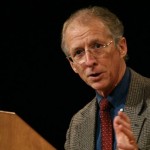 Romans 9 – Paul’s answer as to why most of Israel failed to recognize the Messiah (a huge issue) is that there is “an ‘Israel’ within ethnic Israel” and these, the true Israel, in fact did recognize Messiah. God’s word has not failed in any way at all. (Romans 9: 6)
Romans 9 – Paul’s answer as to why most of Israel failed to recognize the Messiah (a huge issue) is that there is “an ‘Israel’ within ethnic Israel” and these, the true Israel, in fact did recognize Messiah. God’s word has not failed in any way at all. (Romans 9: 6)
What follows verse 6 is Paul’s explanation as to why this has ALWAYS been the case – using examples from Israel’s own history. Isaac was chosen, not Ishmael; Jacob was chosen, not Esau.. etc.
God’s choice stands and for this to be the case, it is not based on human works of any kind (foreseen or otherwise). Election is unconditional. God has freedom to have mercy on whom He will. That’s what Romans 9 is all about.
In Romans 10 Paul begins by speaking of Israel’s (unregenerate Israel) present standing with God.
v. 1 Brothers,my heart’s desire and prayer to God for them is that they may be saved. 2 For I bear them witness that they have a zeal for God, but not according to knowledge. 3 For, being ignorant of the righteousness of God, and seeking to establish their own, they did not submit to God’s righteousness.
(1) Paul sincerely desires and prays for Israel’s salvation
An obvious question that arises from this statement is – If God has chosen only some, and this is fixed from all eternity …
(see also Rev 13:8 “and all who dwell on earth will worship it (the beast), everyone whose name has not been written before the foundation of the world in the book of life of the Lamb who was slain”, contrasted with Luke 10:20; Eph 1:4; Phil 4:3),
… why even pray?
Answer: Because God has His ENDS (His elect coming to faith in Christ) and achieves it through the use of MEANS, the prayers of the saints and preaching of the Gospel. God has predestined both those who will be His, and predestined that they come in through hearing and believing the Gospel. There is no contradiction whatsoever between election and evangelism/prayer for the unsaved.
(2) Israel possesses zeal without knowledge (accurate information).
But this lack of knowledge is not merely an innocent ignorance. It is willful, as it stems from them “seeking to establish their own righteousness” before God. In other words, they wish for righteousness before God in defiance of God’s revelation concerning how to achieve it. The reason they don’t believe is that they are trying to earn salvation by their own works, and being proud of their efforts, they refuse to receive salvation as a gift.
Lets remember though that verses 1 and 2 flow from the end of chapter 9 – instead of writing all of Israel off, Paul reveals both his sincere desire for them and his earnest prayer for them.
Prayer is always worthwhile. God’s secret counsel is not known to us (that is why it is secret) and so we can be encouraged by the fact that because something is laid on our heart, behind even this desire, is the God who planted that desire there, who waits to use it as a means to His end. More than that – We don’t know the mind of God in regard to the salvation of sinners, therefore, we should always pray for them..
“when we pray, God answers our prayers and saves those for whom He moves us to pray … God always ordains the means to some goal as well as the ends. So if He has ordained to save a certain individual through our prayers, it is as necessary that we pray for that individual as it is that the individual be saved. Indeed we must pray, since the individual will not be saved apart from the ordained intercession. This should encourage us to pray.
George Muller of Bristol, England, the founder of the great faith orphanages, was a man of outstanding prayer. In his youth he had two friends for whom he began to pray. He kept notes on his prayers, and his notes show that he prayed for them for more than sixty years. One of these men was converted just before Muller’s death at one of the last services Muller held. The other became a Christian within a year of Muller’s funeral. Toward the end of his life, but before his friends’ conversions, someone asked Muller why he was still praying for them after such a long time, since they had shown no response. He answered, “Do you think God would have kept me praying all these years if he did not intend to save them?” It was a point Paul would easily have understood.” (James Montgomery Boice; Romans Commentary, Volume 3, page 1152)

 By John Piper, from the Desiring God Website: www.desiringGod.org
By John Piper, from the Desiring God Website: www.desiringGod.org “Pray daily for a great outpouring of the Spirit on the Church and on the world. This is the grand need of the day – it is the thing that we need far more than money, machinery, and men. The “company of preachers” in Christendom is far greater than it was in the days of Paul; but the actual spiritual work done in the earth, in proportion to the means used, is undoubtedly far less. We need more of the presence of the Holy Spirit, more in the pulpit, and more in the congregation, more in the pastoral visit, and more in the school. Where He is, there will be life, health, growth, and fruitfulness. Where He is not, all will be dead, tame, formal, sleepy, and cold. Then let everyone who desires to see an increase of pure and undefiled religion, pray daily for more of the presence of the Holy Spirit in every branch of the visible Church of Christ.” – J.C. Ryle
“Pray daily for a great outpouring of the Spirit on the Church and on the world. This is the grand need of the day – it is the thing that we need far more than money, machinery, and men. The “company of preachers” in Christendom is far greater than it was in the days of Paul; but the actual spiritual work done in the earth, in proportion to the means used, is undoubtedly far less. We need more of the presence of the Holy Spirit, more in the pulpit, and more in the congregation, more in the pastoral visit, and more in the school. Where He is, there will be life, health, growth, and fruitfulness. Where He is not, all will be dead, tame, formal, sleepy, and cold. Then let everyone who desires to see an increase of pure and undefiled religion, pray daily for more of the presence of the Holy Spirit in every branch of the visible Church of Christ.” – J.C. Ryle